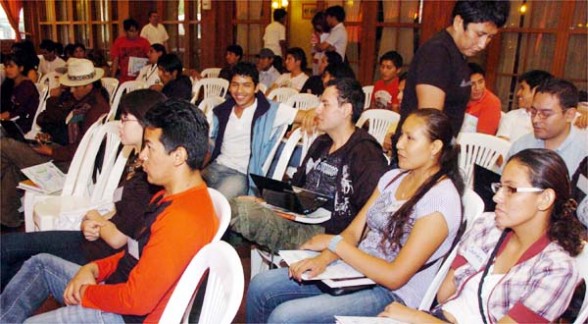Inteview with Leo Klinkers, co-author of the European Federalist Papers
Today we have the pleasure of interviewing Leo Klinkers, the responsible, together with Herbert Tombeur, of the European Federalist Papers. You can follow him on twitter. And you can get more info about his project in the European Federalist Papers’ website.
“After more than two hundred years Europe has finally reached the momentum that the Americans already had in 1787. Time to act.”

-Mr. Klinkers, what can you tell us about your background?
I studied law at the University of Utrecht in the Netherlands (1964-1968), specializing in State Law, Administrative Law and Public Administration. After two years working as a civil servant at a local authority I was invited to return to the Law Faculty in Utrecht to teach and to conduct research in the field of Public Administration. During this period I completed my Ph.D. in law and public administration, and developed a new method for interactive public policymaking. Thirteen years later (1983) I decided to leave the university to establish my own company: Klinkers Public Policy Consultants.
2020 Summer Olympics in Madrid: Necessary? Affordable?
Becoming the venue of Summer Olympics is commonly seen as synonym of prestige. Every four years several cities try to host the main sportive event around the world. Nonetheless, in each country many voices claim against what these kind of projects mean: a huge amount of money invested, without any warranties of recovering it. Then, is it really a good idea to become the venue of Summer Olympics?
En mi siguiente vida quiero ser…
Tratar de entender todo lo que nos acontece diariamente como seres humanos puede resultar extremadamente complejo, aunque se trate de situaciones cotidianas, ya que se nos presenta el problema de interpretar y asimilar cuestiones en su mayoría ajenas a nosotros.
En este sentido, podemos hacernos una idea de lo difícil que resulta explicar una situación económica adversa como es la que vivimos, pues ahora mas que nunca somos conscientes de que la economía no trata sólo de cifras ajenas a nosotros, sino que éstas, las cifras, causan el drama que algunos viven. Una de las consecuencias mas graves de la crisis es la de los desahucios. Dicha realidad, de por sí dura, se agrava en un país como España, pues además de quedarte sin hogar te ves forzado a seguir pagando por una vivienda que ya no posees.
Lo que aprendimos de las pasadas elecciones estadounidenses
El resultado es, a unas semanas de la constitución del 113 Congreso de los Estados Unidos y dos días después de que Barack Hussein Obama jurase su cargo como Presidente por segunda vez, ya conocido: el candidato demócrata ganó las elecciones para un segundo mandato, derrotando a Mitt Romney (que sufrió para conseguir la nominación en unas muy disputadas primarias republicana) por algo menos de cinco millones de votos, incluidos Ohio, Florida y todos los swing states salvo Carolina del Norte; los demócratas ampliaron una mayoría de la que ya disponían en el Senado desde 2006 sin llegar a la mágica cifra de 60 senadores; por su parte, la Cámara de Representantes siguió bajo control del Partido Republicano, a pesar de un leve avance demócrata. Básicamente, todo sigue igual que a finales del 112 Congreso.

Sin embargo, hay algunas claves que hemos de tener en cuenta para entender ciertos cambios que están dándose en la política estadounidense:
Democracies: now we are talking
Nowadays, one of the most common forms of government is Democracy. It is usually based on the idea of equality among the citizens of a country. Due to this, laws affect similarly to all of us and the political parties are elected in a fair way. At least, theoretically. Reality is quite different, as we all know. However, before talking about this matter, it is worth pointing out the origins of Democracy.
Officially, it was implanted firstly in Ancient Greece, in Athens, during the government of Pericles. Its main precedent was the legislative reform established by Cleisthenes in the last few years of VI century BC, which is called isonomia, i. e., “equality of political rights”. Before that, it should be noted the work of Solon, a lawmaker that in 594 BC made a big effort in order to solve several political, economical and moral problems of Athens. One century and a half later, Democracy began as an institutionalised political system.
A new security and defense policy for Spain, 1975-1988: C)Relations with the USA and Western European Union
A new Convention with the United States
One of the main consequences of the Atlantist turn of Felipe González was to renegotiate agreements with the United States. The 1953 agreements had been renewed periodically, not without some difficulty. In 1976 a Treaty was signed for the first time: until then, it had not reached such legal category. In 1982 a Convention was established; the Treaty ceased to be bilateral and became to be subordinated to the North Atlantic Treaty. In 1983 a protocol was introduced to clarify that the Convention did not involve the entry of Spain into the military structure of NATO.
A new security and defense policy for Spain, 1975-1988: B)Spain’s entry into NATO
Francisco J. Rodrigo writes his second article about the security and defense policy for Spain between 1975 and 1988. In this case he is going to talk about the Spanish entry into NATO, finally occurred in 1982.
Despite Franco’s death in 1975, Spanish Government was having serious difficulties in the integration within the European Community. Pending the admission in the EEC, Spain wanted to open other doors: with the consolidation of its participation in the process born in Helsinki, Madrid launched its own European integration in two organizations of security and defense: the North Atlantic Treaty Organization (Euroatlantic) and the Western European Union.
A new security and defense policy for Spain, 1975-1988: A)The Conference on Security and Cooperation in Europe (CSCE)
This week, in WithTheVoices, Francisco J. Rodrigo, is going to tell us about the “new security and defense policy for Spain” right after Franco’s death and during the Transition period (more concretely, between 1975 and 1988). Hereby you can find the first of the three texts elaborated by our collaborator.
Japón: El país del culto al trabajo
Irashaimase! Esta es la primera palabra que se escucha en cualquier lugar de Japón al entrar en un establecimiento comercial. De esta forma saludan todos los empleados del lugar al nuevo cliente. Como forma respetuosa y calurosa de bienvenida, esta exclamativa llega a hacerse tan habitual y rutinaria que a veces es omitida por nuestro cerebro. Ya dentro del establecimiento, si un empleado entra en escena y se percata de nuestra presencia como nuevo visitante, es muy probable que éste se pare junto al cliente y pronuncie el ritual mientras inclina la cabeza. En los bares y restaurantes es incluso habitual que desde la cocina asomen la cabeza los empleados para ejecutar el protocolo.
Interviews with MEPs: Gabriele Zimmer, Die Linke
“The EU has to be a peaceful project which does not look first, as it currently does, on how it gets best access to resources and how it increases its power in the world”
Gabriele Zimmer is a German politician, president of the GUE/NGL group (European United Left/Nordic Green Left) since March 2012, being member of the European Parliament for 8 years in the same political group. Committed to left-wing policies, before her participation in the EP she was president of the German left party PDS (currently Die Linke) from 2000 to 2003.
Youth participation in Latin-American political parties: towards greater involvement
In spite of the progress made, there is no correspondence between the demographic relevance and the political importance of young people. They are the majority of the population in most of Latin-American countries; nevertheless, they are still excluded from most of power spaces and decision-making processes. Political parties are not the exception. The purpose of this article is to present an overview on this topic and some ideas that are being currently discussed in order to improve the participation of young people in political parties.

A recent research conducted by the Inter-American Development Bank and International Idea (GEPPAL)[1]shows that youth participation in Latin American political parties is, in most of the cases, reduced, and even inexistent.
Copyright. Porque todo ha cambiado
*Este artículo fue publicado originalmente en el blog del Cosmonauta.
Vamos a tratar de imaginar la siguiente escena:
Un hombre entra en una tienda de electrodomésticos y pregunta por una lavadora. Un empleado le muestra varias, hasta que el hombre escoge una de ellas y, aunque cree que el precio no es el mejor, es lo suficientemente barata como para decidirse a comprarla.
Cuando saca el dinero de su cartera, el empleado sonríe y le dice que, por desgracia, no puede comprarla en ese momento. La lavadora no está “disponible”, aunque el hombre la tiene delante suyo. El empleado cortesmente le pide que vuelva dentro de tres meses.
Cuando el hombre, enfadado y frustrado, sale del centro comercial, encuentra una lavadora en un callejón. Es el mismo modelo que iba a comprar. Está usada y en peores condiciones, pero funciona, y mejor aún, es gratis y está disponible en ese momento.
El hombre se la lleva a casa contento y, por supuesto, jamás regresa al centro comercial a hacerse con la lavadora que estaba dispuesto a comprar.